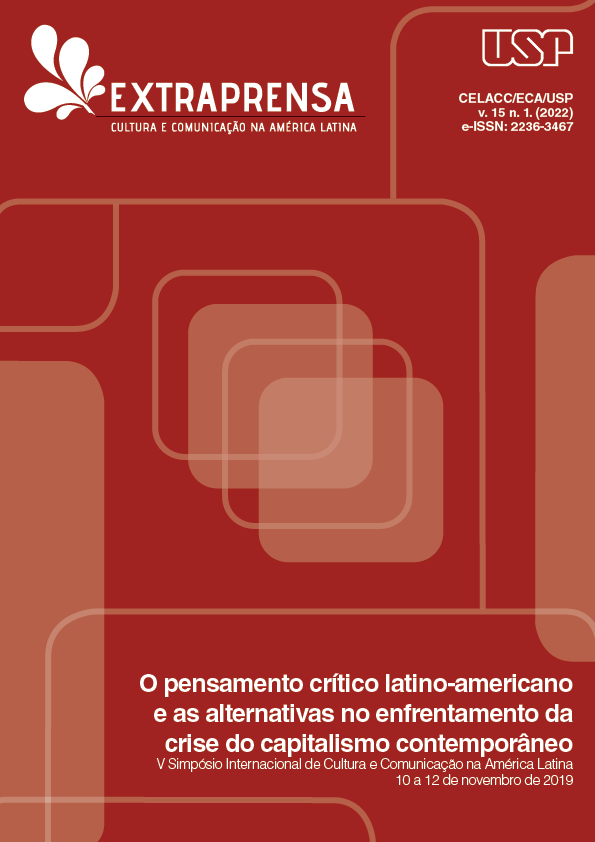Contributions of the new Latin American constitutionalism to the Temporal Framework debate for the demarcation of indigenous lands in Brazil
DOI:
https://doi.org/10.11606/extraprensa2022.194344Keywords:
Time frame, Colonialities, New Latin American constitutionalism, Nature rightsAbstract
The discussion on the “time frame” for the demarcation of indigenous lands in Brazil is currently awaiting a vote in the Federal Supreme Court. The theme involves, among other issues, the discussion about the relationship between indigenous communities and nature. Two opposing approaches to the issue can be identified: one centered on the idea of nature as something to be used, enjoyed, aligning with the colonial construction, and the other (supported by indigenous people) that is concerned with the ancestors of the land, the maintenance of one's own culture and survival. The present study exposes this conflict and deepens the debate from the perspective of Decolonial Studies, especially through the concepts of coloniality of power and knowledge (QUIJANO, 2005); (GROSFOGUEL, 2018); (MIGNOLO, 2001). In addition to bibliographic research, documentary research is used to analyze how the “new Latin American constitutionalism” and, in particular, the 2008 Constitution of Ecuador addresses the relationship between human beings and nature. Hopefully, the results can add another perspective to the discussion of the “time frame” in Brazil.
Downloads
References
ACOSTA, Alberto. O Bem viver: uma oportunidade para se imaginar outros mundos. São Paulo: Autonomia literária, Elefante, 2016.
BRASIL. Constituição Federal do Brasil de 1988. Constituição da República Federativa do Brasil: promulgada em 5 de outubro de 1988. 4. ed. São Paulo: Saraiva, 1990.
BERCOVICI, Gilberto. A Constituição brasileira de 1988, as “Constituições transformadoras” e o “novo constitucionalismo latino-americano”. In: ARAÚJO, Marcelo Labanca Corrêa; SANTOS, Gustavo Ferreira; STRECK Lênio Luiz (org.). Direitos e democracia no novo constitucionalismo latino-americano. Belo Horizonte: Arraes Editores, 2016. p 01 – 17.
CANDIDO, Marcos. O que é o Marco Temporal e como ele impacta os povos indígenas. Portal UOL, São Paulo, jornal, 02 de junho de 2020. Disponível em: <https://www.uol.com.br/ecoa/ultimas-noticias/2020/06/02/o-que-e-o-marco-temporal-e-como-ele-impactaindigenas-brasileiros.htm?cmpid=copiaecola>. Acesso em: 18 de outubro de 2021.
ECUADOR. Constitución de la Republica del Ecuador de 2008. Disponível em: <https://siteal.iiep.unesco.org/pt/bdnp/290/constitucion-republica-ecuador>. Acesso em: 26 de out. 2021.
GROSFOGUEL, Ramón. Para uma visão decolonial da crise civilizatória e dos paradigmas da esquerda ocidentalizada. In: BERNARDINO-COSTA, J. GUDYNAS, Eduardo. Buen vivir: Germinando alternativas al desarrollo. América Latina en movimiento (ALAI). Quito: 2011. Disponível em: <https://flacsoandes.edu.ec/web/imagesFTP/1317332248.RFLACSO_2011_Gudynas.pdf> Acesso em 26 out. 2021.
OSORIO, Rafael Guerreiro. A desigualdade racial no Brasil nas três últimas décadas. Brasília: Ipea, 2021. 27 p. Disponível em: <https://www.ipea.gov.br/portal/index.php?option=com_content&view=article&id=38083&Itemid=457>. Acesso em: 18 de outubro de 2021.
MALDONADO-TORRES, N.; GROSFOGUEL, R. (org.). Decolonialidade e pensamento afrodiáspórico. Belo Horizonte: Autêntica Editora, 2018. p. 55-77.
MIGNOLO, W. D. “Desobediencia epistémica II. Pensamiento independiente y libertad De-colonial.” Otros Logos: Revista de Estudios Críticos, Neuquén, ano 1, n. 1, p. 8-42, 2010.
Disponível em: <http://www.ceapedi.com.ar/otroslogos/Revistas/0001/Mignolo.pdf>. Acesso em: 18 de outubro de 2021.
PIRES, Thula. Por um constitucionalismo ladino-amefricano. In: BERNARDINO-COSTA, J.; MALDONADO-TORRES, N.; GROSFOGUEL, R. (org.). Decolonialidade e pensamento afrodiáspórico. Belo Horizonte: Autêntica Editora, 2018. p. 55-77.
QUIJANO, Aníbal. Colonialidade do poder, eurocentrismo e América Latina. In: A colonialidade do saber: eurocentrismo e ciências sociais. Perspectivas latino-americanas. Edgardo Lander (org). Colección Sur Sur, CLACSO, Ciudad Autónoma de Buenos Aires, Argentina. setembro 2005. pp.227-278.
QUIJANO, Aníbal. Buen vivir, entre desarollo y la descolonialidad de poder. In: Ecuador Debate. Acerca del Buen Vivir, Quito: Centro Andino de Acción Popular CAAP, 2011.
STRECK, Lênio Luiz; Oliveira, Fábio Corrêa. Reflexões sobre o novo constitucionalismo latino-americano. In: ARAÚJO, Marcelo Labanca Corrêa; SANTOS, Gustavo Ferreira; STRECK Lênio Luiz (org.). Direitos e democracia no novo constitucionalismo latinoamericano. Belo Horizonte: Arraes Editores, 2016. p.119-145
Downloads
Published
Issue
Section
License
Copyright (c) 2022 Paloma Gerzeli Pitre, Andrea Rosendo da Silva

This work is licensed under a Creative Commons Attribution-NonCommercial-NoDerivatives 4.0 International License.
Ao submeter qualquer material científico para Extraprensa, o autor, doravante criador, aceita licenciar seu trabalho dentro das atribuições do Creative Commons, na qual seu trabalho pode ser acessado e citado por outro autor em um eventual trabalho, porém obriga a manutenção de todos os autores que compõem a obra integral, inclusive aqueles que serviram de base para o primeiro.
Toda obra aqui publicada encontra-se titulada sob as seguintes categorias da Licença Creative Commons (by/nc/nd):
- Atribuição (de todos os autores que compõem a obra);
- Uso não comercial em quaisquer hipóteses;
- Proibição de obras derivadas (o trabalho não poderá ser reescrito por terceiros. Apenas textos originais são considerados);
- Distribuição, exibição e cópia ilimitada por qualquer meio, desde que nenhum custo financeiro seja repassado.
Em nenhuma ocasião a licença de Extraprensa poderá ser revertida para outro padrão, exceto uma nova atualização do sistema Creative Commons (a partir da versão 3.0). Em caso de não concordar com esta política de Direito Autoral, o autor não poderá publicar neste espaço o seu trabalho, sob pena de o mesmo ser removido do conteúdo de Extraprensa.







